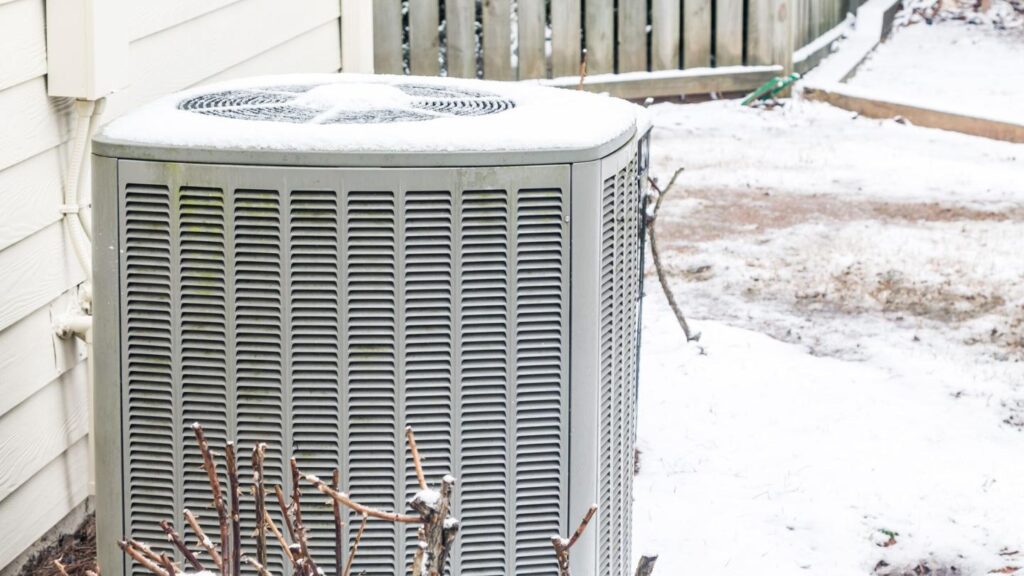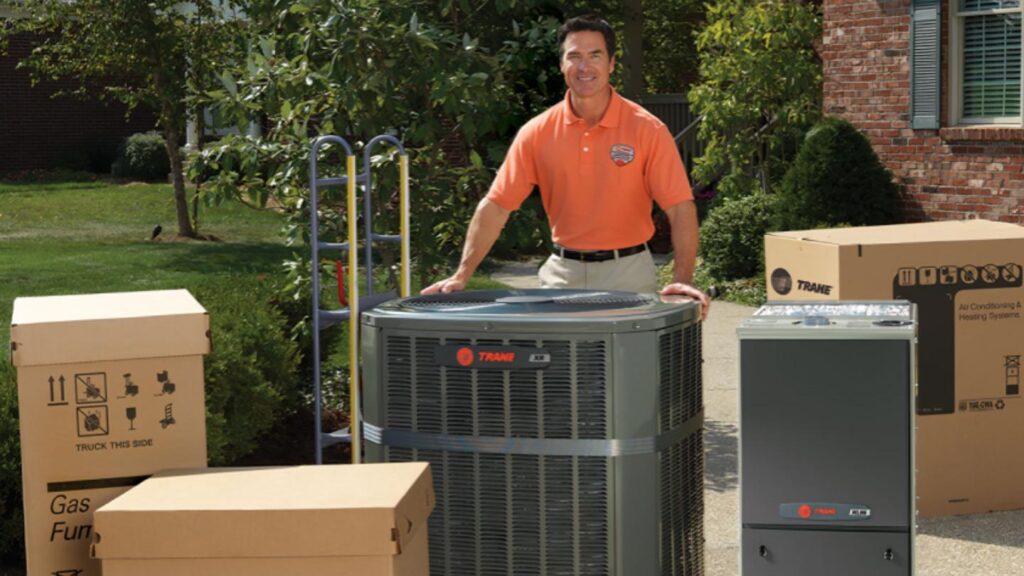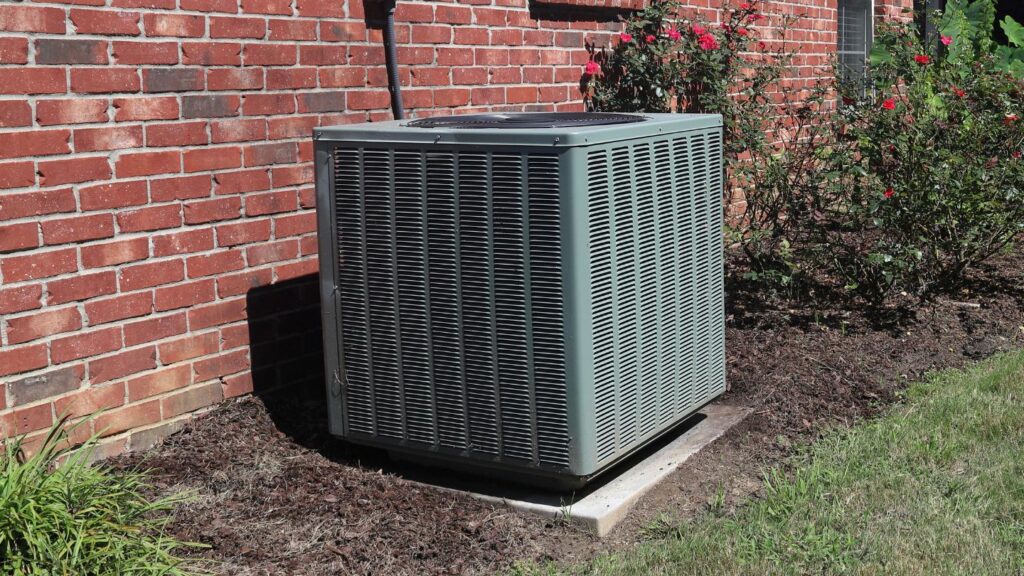Top Tips on How to Keep Your Heat Pumps from Freezing During Winter
Worried about your heat pump freezing during the winter? This guide provides expert-backed tips on preventing freeze-ups to keep your heat pump running efficiently all season long. We’ll cover routine maintenance, common causes of freezing, and how professionals can address and prevent these issues effectively.
Key Takeaways
- Understanding the defrost cycle is crucial for preventing heat pump freezing during winter, as it ensures the system operates at optimal efficiency.
- Common causes of heat pump freezing include malfunctioning defrost systems, restricted airflow, and exposure to severe weather conditions, all of which require prompt professional assessment and repair.
- Professional maintenance, such as regular inspections, air filter replacements, and outdoor unit cleaning, is essential for ensuring heat pumps remain operational and ice-free during colder months.
Understanding How Heat Pumps Work in Winter
Heat pumps operate during the winter by extracting heat from the outside air and using it to warm your home, even in low temperatures. These systems are designed with advanced anti-freeze capabilities, including Enhanced Vapor Injection (EVI) technology, enabling them to function effectively in colder climates and maintain consistent performance despite dropping temperatures.
One critical feature that ensures a heat pump’s efficiency during freezing conditions is its defrost cycle. This cycle prevents ice buildup on external components, which could otherwise disrupt the system’s operation. During defrosting, the reversing valve temporarily switches the system’s mode to operate like an air conditioner. Simultaneously, the outdoor fan halts while refrigerant lines warm up to melt accumulated ice. This process, typically lasting around 10 minutes, is crucial for maintaining the heat pump’s efficiency and functionality during cold weather.
Read more: How Does a Heat Pump Work in Winter?
Understanding these operational mechanisms underscores the importance of professional maintenance and timely servicing. A trained technician can inspect and fine-tune your heat pump’s components to ensure consistent performance, especially during extreme winter conditions. Recognizing these details helps homeowners appreciate the preventive care required for optimal heat pump efficiency and reliability as temperatures drop.
Common Causes of Heat Pump Freezing

Heat pumps are designed to operate efficiently in cold conditions, but various factors can still cause them to freeze. Here are some common causes:
- Malfunctioning defrost cycles, often due to insufficient refrigerant levels or defective thermostats.
- Problems with critical components like the defrost control board or reversing valve, preventing proper defrosting.
- Severe weather conditions, such as heavy snowfall or icy rain, exacerbating freezing issues.
- Airflow obstructions caused by clogged filters or dirty coils, reducing efficiency and increasing frost risk.
- Poor airflow allowing cold air to cause further icing, leading to extensive freeze-ups if unaddressed.
Professional maintenance is crucial for identifying and addressing these issues before they escalate. Certified technicians can ensure adequate refrigerant levels, inspect defrost components, and clean airflow obstructions to keep your heat pump running smoothly. By addressing these potential triggers promptly, you can maintain optimal performance and prevent freeze-ups, even in harsh winter conditions.
Regular Maintenance to Prevent Heat Pump Freeze-Ups
Consistent professional maintenance is essential for ensuring your heat pump operates efficiently and remains ice-free during colder months. Regular upkeep not only prevents freeze-ups but also promotes optimal performance and extends the life of your system.
Below, we highlight key professional maintenance activities that are critical for preventing ice accumulation and keeping your heat pump functioning seamlessly.
Replace Air Filters Regularly
Maintaining clean air filters is vital for the efficient operation of your heat pump. Clogged or dirty filters restrict airflow, forcing the system to work harder and increasing the risk of freeze-ups. To avoid such issues, professionals recommend replacing air filters at least every three months or more frequently if they become visibly soiled.
Technicians also inspect air vents to ensure they are free from obstructions, such as furniture or debris, which can hinder airflow. These routine checks help preserve the overall efficiency of your heat pump and prevent freezing issues during low temperatures.
Clean Outdoor Unit
The outdoor unit is a critical component of your heat pump system, and its cleanliness directly affects performance. Professionals clear away debris, leaves, and snow from the surrounding area to ensure unobstructed airflow. They also clean condenser coils to remove dirt buildup that could strain the system and contribute to freezing.
These maintenance tasks, performed by certified HVAC experts, ensure the outdoor unit remains ice-free and operating efficiently, even in harsh winter conditions.
Schedule Biannual HVAC Inspections
Biannual HVAC inspections by professionals are crucial for maintaining your heat pump’s reliability. Technicians conduct detailed evaluations of the system to detect and address potential freezing issues before they escalate. Ideally, these inspections should be scheduled in the spring and fall to prepare your system for seasonal transitions.
During these visits, certified HVAC specialists check airflow, refrigerant levels, and the mechanical integrity of your heat pump. These thorough assessments help ensure all components function optimally, significantly reducing the risk of freezing problems.
Professional Solutions for a Frozen Heat Pump

Even with consistent maintenance, heat pumps can occasionally freeze during winter. When this happens, professional intervention is the safest and most effective way to resolve the issue. Experts are equipped to diagnose and address the root causes of freezing, ensuring your system is restored without the risk of further damage.
Below are some of the steps that professionals typically take to resolve freezing issues in heat pumps:
Inspect and Adjust System Settings
If a heat pump has frozen over, professionals will often begin by inspecting the system settings and activating fan mode to help initiate the defrost cycle. This controlled process thaws ice safely and prevents additional harm to the system. Certified technicians ensure that the defrost cycle functions correctly and address any underlying issues that may disrupt the process.
Remove Ice Safely and Efficiently
In cases of significant ice buildup, professionals use safe and effective methods to clear the ice without damaging sensitive components. Techniques like using warm water or specialized tools are employed to melt ice while avoiding sharp instruments that could harm internal parts. This ensures the system remains intact and operational.
Check and Repair Thermostat and Sensors
Technicians thoroughly inspect the thermostat and sensors for malfunctions that could hinder the defrost cycle. Common issues, such as an impaired defrost control board, a faulty reversing valve, or inaccurate timer settings, are identified and promptly addressed by professionals. These repairs ensure the system can effectively initiate the defrost cycle and prevent future freezing problems.
By entrusting your heat pump to certified professionals, you can avoid the risks associated with self-attempted fixes and ensure your system is restored to optimal performance.
Advanced Preventative Measures
For homeowners seeking additional strategies to protect their heat pump, advanced preventative measures can significantly reduce the risk of freezing. These proactive steps go beyond regular maintenance and are crucial for keeping your system ice-free, even during the most severe winter conditions.
Insulate Pipes
Professionals recommend insulating the heat pump’s pipes to provide thermal protection and prevent freezing during cold weather. Using materials like foam rubber or fiberglass sleeves helps maintain warmth within the pipes, reducing the likelihood of quick temperature drops that lead to ice formation. This insulation ensures the heat pump remains effective, even in extremely low temperatures, by safeguarding its critical components.
Elevate the Heat Pump Unit
HVAC experts often recommend elevating the heat pump unit above ground level to minimize contact with groundwater or snow accumulation. Raising the unit prevents exposure to cold, damp surfaces that can contribute to freezing. This professional modification helps maintain both the efficiency and operational reliability of the system during freezing weather.
Install a Cover for Severe Weather
To protect the heat pump from ice and snow, professionals may install weather-resistant covers designed to shield the unit while allowing adequate airflow. Properly designed covers prevent debris buildup and ice formation without causing overheating. This protective layer ensures the system operates efficiently during severe weather events.
When to Call a Professional
If freezing issues persist despite preventative measures, professional intervention is essential. Continual ice accumulation or odd noises from the heat pump may indicate deeper mechanical problems requiring expert diagnosis and repair. Certified technicians can address issues like malfunctioning defrost modes, failing components, or refrigerant imbalances to restore the system’s functionality.
Attempting to resolve these issues without professional expertise can lead to further damage. HVAC specialists use precise tools and techniques to identify and fix problems, ensuring the long-term performance and efficiency of your heat pump.
Benefits of Professional Heat Pump Maintenance

Regular professional maintenance is essential for preserving the efficiency and longevity of your heat pump while minimizing the risk of ice buildup. Annual maintenance ensures that potential issues are identified and resolved before they escalate, saving homeowners significant costs on repairs and replacements. Routine servicing can extend a heat pump’s operational life to an estimated 10–15 years, ensuring long-term reliability and performance.
In addition to improving efficiency, professional maintenance enhances indoor air quality by removing accumulated pollutants and debris within the system. This comprehensive care not only ensures seamless operation but also provides financial savings and peace of mind for maintaining a comfortable home environment.
Summary
To prevent your heat pump from freezing during the winter, it’s crucial to engage in regular professional maintenance and implement advanced preventative strategies. By understanding the operational mechanisms of your heat pump and addressing potential freezing causes, you can ensure efficient functionality even in harsh conditions.
Total Comfort Cooling & Heating Inc. provides expert services for heat pump repair in Port Charlotte, FL, ensuring your system remains in top condition. With our professional care, you can trust that your heat pump will stay ice-free and operate smoothly throughout the winter season. Contact us today to keep your home warm and comfortable!
Frequently Asked Questions
Why does my heat pump freeze even with regular maintenance?
While regular maintenance reduces the likelihood of freezing, extreme weather conditions or hidden issues, like a malfunctioning defrost system, can still cause ice buildup. A professional inspection can pinpoint and resolve such underlying problems.
How often should HVAC maintenance be scheduled?
To ensure peak performance, it is recommended that HVAC maintenance be carried out in Port Charlotte semi-annually, with the best times being during the spring and autumn seasons. Consistent maintenance will improve both the efficiency and durability of your HVAC system.
Is it normal for frost to appear on a heat pump during winter?
A light layer of frost is normal, but excessive ice covering the coils or outdoor unit is a sign of a problem. Prompt professional intervention can prevent further issues and maintain the system’s efficiency.
READY FOR YOUR NEXT HEATING OR COOLING PROJECT?
Contact us to get a quote and see why our customer service is recognized as the best in the industry.




